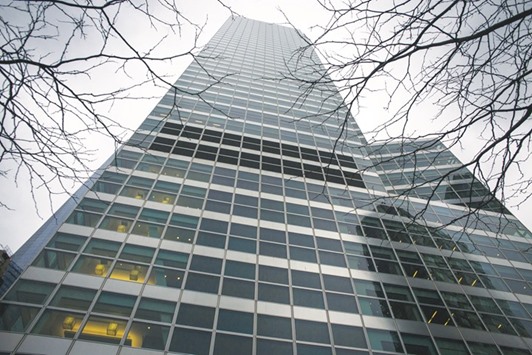Goldman Sachs Group Inc lead-managed a Japanese institution’s first sale of bonds with negative yields, amid rising demand from foreign investors who can profit from currency swaps.
State-backed Deposit Insurance Corp of Japan issued ¥120bn ($1.1bn) of two-year notes with an effective yield of minus 0.124% and ¥100bn of four-year debt at minus 0.084% earlier this month.
The negative yields aren’t a disincentive for overseas investors: using cross-currency basis swaps, dollar-based holders of two-year Japanese debt are still able to get a yield that’s 78 basis points higher than similar-maturity US Treasuries, according to Bloomberg calculations.
“It seems to be aimed at foreign investors,” said Naoya Oshikubo, a rates strategist at Barclays Plc in Tokyo. “Given the two- and four-year maturities, and with Goldman lead- managing, it can be assumed that demand from foreign investors probably is the biggest reason behind this issuance.”
While Japanese investors have had to put their money in ever riskier assets to earn returns with more than 70% of local sovereign notes yielding less than zero, foreigners have been able to use swap contracts to profit even with notes having negative yields.
Overseas investors have been net buyers of Japanese debt for seven straight weeks through May 13, according to Ministry of Finance data.
Hiroko Matsumoto, a Tokyo-based spokeswoman at Goldman Sachs, declined to comment.
While both of DIC’s bonds have a 0.1% coupon, the two-year notes are priced at ¥100.45 and the four-year debt is ¥100.74, with holders getting paid ¥100 when the securities mature.
“It is a symbolic case in the negative-rate era,” said Yasunobu Katsuki, a senior analyst at Mizuho Securities Co. “They’re the first government-guaranteed bonds to be issued with yields that are this deeply negative. It’s also rare for a foreign financial institution to lead-manage such bonds which have thin margins.”
The discount offered to dollar holders to borrow yen for two years in the swap market reached 83 basis points in November, the most in four years, and was 68 basis points on Friday.
Foreigners held 10.6% of Japanese government bonds and Treasury bills in the final quarter of 2015, a record high, according to Bank of Japan data.
Overseas investors owned 48.9% of T-bills at the end of last year, suggesting that they mainly put their money in shorter debt, Ministry of Finance data show.
Goldman’s role may also suggest that foreign firms are trying to attract Japanese demand amid dwindling investment opportunities, said Nana Otsuki, the chief analyst at Monex Group Inc, a Tokyo-based online securities firm.
Yields on the DIC bond aren’t as negative as equivalent sovereign notes, and the possibility of tumbling debt prices is low considering that the BoJ will likely keep its easy policy for some time, she said.
Yields on state-backed institution notes probably have limited room to fall, unlike Japanese sovereign bonds, which are driven by expectations that the central bank will buy them at higher prices at market operations in a so-called BoJ trade, said Oshikubo at Barclays.
“Rates lower than the BoJ’s minus 0.1% policy rate on shorter-dated JGBs are justified only by the BoJ trade,” he said. “There is very little such demand for government-backed bonds, so the negative trade is unlikely to gain momentum.”

Goldman Sachs Group headquarters is seen in New York. Goldman lead-managed a Japanese institution’s first sale of bonds with negative yields, amid rising demand from foreign investors who can profit from currency swaps.
